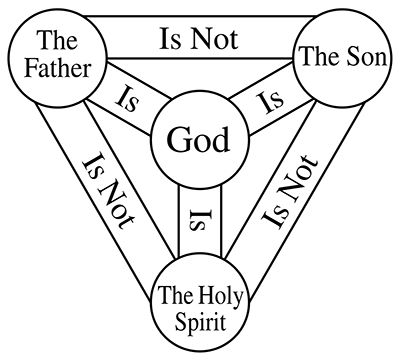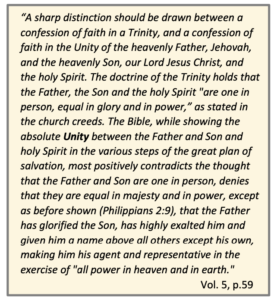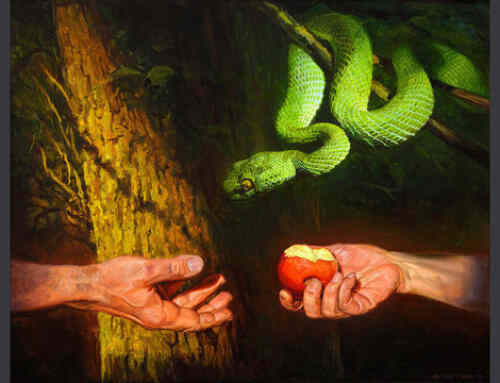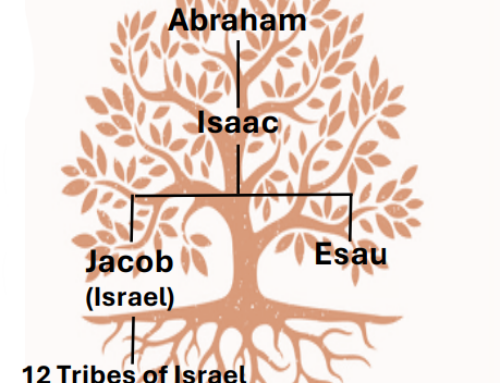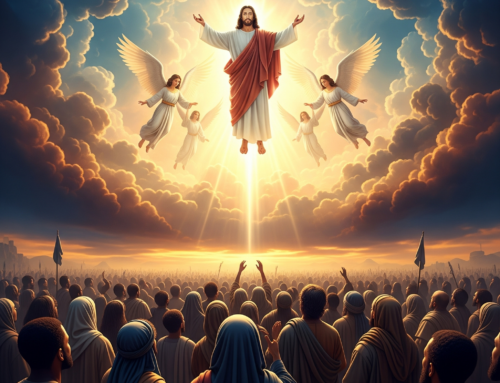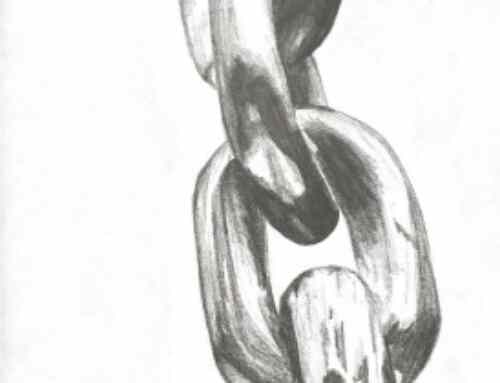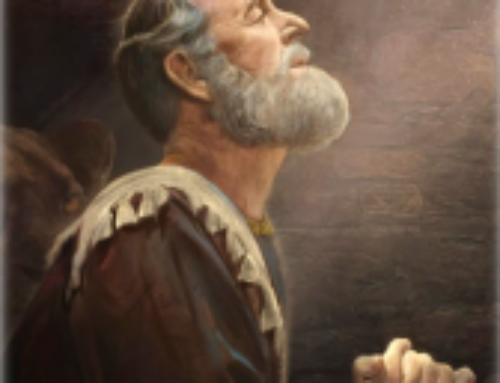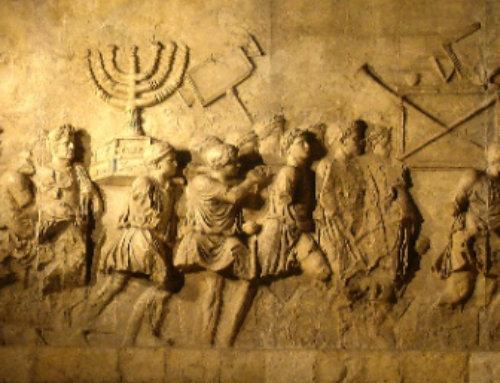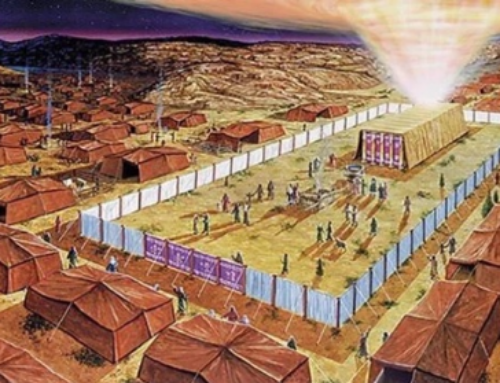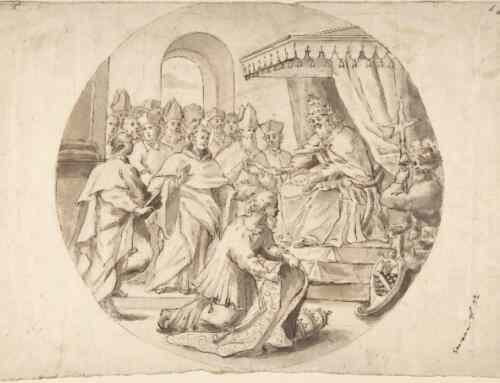The Trinity
Goal of this Study: WHAT do the Scriptures teach about the relationship between God, Jesus and the Holy Spirit?
WHEN and HOW did this concept of a trinity begin?
WHAT are the scriptural implications of this belief?
Additional references: Studies in the Scriptures Vol. 5 pp.54–82; Reprints 1410 and 5747
What is the doctrine of the trinity?
Catholic Catechism (Wikipedia: Trinity): “The Christian doctrine of the Trinity (Latin: Trinitas, lit. ’triad’, from Latin: trinus threefold’) is the central doctrine concerning the nature of God in most Christian churches, which defines one God existing in three coequal, coeternal, consubstantial divine persons: God the Father, God the Son (Jesus Christ) and God the Holy Spirit, three distinct persons (hypostases) sharing one essence/substance/nature (homoousion).”
 Christian website (GotQuestions.com): “The Trinity is Christianity’s most unique, defining, incomprehensible, and awesome mystery. It is the revelation of who our Almighty Creator actually is—not just a god, but an infinite Being existing in eternity as three co-equal, infinite Persons, consubstantial yet distinct. The origin of the doctrine of the Trinity is the Bible, although the word ‘Trinity’ is not used in the Bible. As all orthodox Christians agree, the doctrine of the Trinity holds that God is one essence but three Persons; God has one nature, but three centers of consciousness; God is only one What, but three Who’s. Some unbelievers mistakenly call this a contradiction. Rather, the doctrine of the Trinity is a mystery revealed by God in His Word. A contradiction would be to claim that God has only one nature but also three natures, or that He is only one Person but also three Persons.”
Christian website (GotQuestions.com): “The Trinity is Christianity’s most unique, defining, incomprehensible, and awesome mystery. It is the revelation of who our Almighty Creator actually is—not just a god, but an infinite Being existing in eternity as three co-equal, infinite Persons, consubstantial yet distinct. The origin of the doctrine of the Trinity is the Bible, although the word ‘Trinity’ is not used in the Bible. As all orthodox Christians agree, the doctrine of the Trinity holds that God is one essence but three Persons; God has one nature, but three centers of consciousness; God is only one What, but three Who’s. Some unbelievers mistakenly call this a contradiction. Rather, the doctrine of the Trinity is a mystery revealed by God in His Word. A contradiction would be to claim that God has only one nature but also three natures, or that He is only one Person but also three Persons.”
- Note: Trinitarians differ greatly on what they believe comprises the nature of God.
Where in the Bible is the word “trinity” found?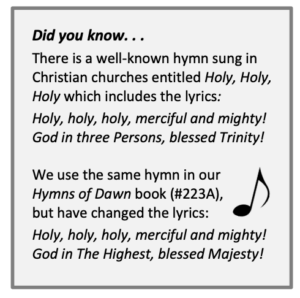
“Trinity” is not found in Scripture. However, a Trinitarian will quickly point to these verses:
- 1 John 5:7–8 Nearly all scholars agree this verse is not found in the oldest Greek manuscripts but was added after the 4th century ad. It is not found in most modern translations.
- Isaiah 6:3 and Revelation 4:8 These verses use the phrase “Holy, Holy, Holy” to describe God. Some Trinitarians would argue that this phrase points to the Trinity, describing God with the same three words repeated.
- John 1:1 (This verse will be addressed later.)
- John 10:30 (This verse will be addressed later.)
When was the trinity added to Christendom’s beliefs?
- The term was coined by Theophilus of Antioch (died 183ad) a full 150 years after our Savior’s crucifixion. “Trinity” according to Theophilus did not refer to the Father, Son and Holy Spirit. Theophilus himself puts it as “God, his Word (Logos) and his Wisdom.” Arguments to define “trinity” took place over the next 200 years.
- The First Council of Nicaea was held in Nicaea, a city in Turkey, in 325ad. It was here the Nicene Creed was born. It wasn’t until the Second Council met in 381ad, that the creed was amended to include the Holy Spirit, and thus the concept of a ‘trinity’ was established.
- At the first Council of Nicaea, Constantine the Great was the emperor of the Roman empire, and he wanted to define Christian beliefs. The council met from May through July 325ad. It was “historically significant as the first effort to attain consensus in the church through an assembly representing all of Christendom. [Constantine] invited all 1,800 bishops of the Christian church within the Roman Empire (about 1,000 in the East and 800 in the West). The Council was the first occasion where the technical aspects of Christology were discussed. Through it a precedent was set for subsequent general councils to adopt creeds and canons.…” (Wikipedia)
- There were two famous leaders at the Nicene Council who argued opposing ideas about the definition of Christ:
Arius—believed God and Jesus were separate beings, that Jesus was the son of God who existed before becoming a man, and the very first thing God ever created was the Logos. Only God had no beginning. Jesus was created and begotten of God.
Athanasius—a very popular priest who believed Jesus “was begotten, not made, being of one substance with the Father.” (Nicene Creed)

“After almost three hundred years of persecution, Christianity made an astonishing breakthrough in 324 when Constantine the Great became the emperor of Rome. No longer fearing for their own survival, Christians turned to the question of how to define what beliefs identified a ‘true’ Christian. Led by two charismatic priests—Arius who preached that Jesus, though uniquely holy, is less than God, and Athanasius who argued that Jesus is God himself in human form—the debate over Jesus’
degree of divinity escalated from heated argument to violence and bloodshed.”
When Jesus Became God by Richard E. Rubenstein
Eusebius of Caesarea was an influential historian, theologian and powerful bishop who participated in the Council of Nicaea. Although he initially showed some sympathy for Arius’ views, he eventually signed the Nicene Creed after modifications were made to address his concerns. He introduced the concept of homoousios [a Greek word that means “same in being, same in essence”] into the creed.
What are some scriptures that would seem to support the view of Arius?
- 1 Corinthians 8:6 “For us there is only one God, the Father, from whom are all things, and we exist for Him; and one Lord, Jesus Christ, by whom are all things, and we exist through him.”
- Colossians 1:15–17 “He is the image of the invisible God, the firstborn of all creation: for by him all things were created, both in the heavens and on earth, visible and invisible, whether thrones, or dominions, or rulers, or authorities—all things have been created through him and for him. He is before all things, and in him all things hold together.”
- Proverbs 8:22–31 “The Lord created me at the beginning of His way, before His works of old. From eternity I was established, from the beginning, from the earliest times of the earth. When there were no ocean depths, I was born, when there were no springs abounding with water. Before the mountains were settled, before the hills, I was born…”
- John 14:28 “The Father is greater than I.”
- John 13:16 “Truly, truly I say to you, a slave is not greater than his master, nor is one who is sent greater than the one who sent him.”
- 1 Corinthians 15:27–28 “For He has put all things in subjection under his feet. But when He says, All things are put in subjection, it is clear that this excludes the Father who put all things in subjection
to him. Now when all things are made subject to Him, then the son himself will also be subject to Him who put all things under him, that God may be all in all.” - Revelation 3:14 “To the angel of the church in Laodicea write: The Amen, the faithful and true Witness, the Origin of the creation of God, says this…”
What are some scriptures that would seem to support the view of Athanasius?
- John 10:30 “I and the Father are one.” They are one in purpose. Jesus prophetically says:
- Psalm 40:8 “I delight to do Your will, my God! Your Law is within my heart.”
- John 1:1 “In the beginning was the Word, and the Word was with God, and the Word was God.”
At first glance this Scripture causes some confusion, but what is the meaning in the Greek?
“…where the word Theos is used twice in the same clause the Greek Prepositive Article is sometimes used, so as to give the effect of the God in contrast with a God. An illustration of this is found in John 1:1—”The Word was with the God [ho theos] and the Word was a God [theos].” Vol. 5, p.70
“[Jesus] was a god (Mighty One) before he came into the world; he also was a god from the time he received the begetting of the Holy Spirit at Jordan; and he is still a god, set down at the right hand of the Father. But he is not THE God; he never was and never will be. Note again his own words after his resurrection, when speaking to Mary Magdalene: John 20:17 “I ascend to my Father and your Father; to my God and your God.” Reprint 5748
- Colossians 2:9 (kjv) “For in him dwelleth all the fulness of the Godhead [Greek theotes] bodily.”
- (nasb20) “For in him all the fullness of Deity [Greek theotes] dwells in bodily form.”
In the nasb, “Deity” is the correct translation. Deity can simply mean “of divine status, quality or nature,” but it has taken on the definition in Christianity of “the Creator or Supreme Being” and applied to the trinity. Theotes is rendered Godhead in Colossians 2:9; whereas it should be translated Deity. This is the only occurrence of this word in the New Testament. See Vol. 5, p.71
- Philippians 2:5–7 “Have this attitude in yourselves which was also in Christ Jesus, who, as he already
existed in the form of God, did not consider equality with God something to be grasped, but emptied
himself by taking the form of a bond-servant and being born in the likeness of men.”
The meaning of this verse “is that when our Lord Jesus was a spirit being, when he had a God-like form and nature, he was not filled with an ambitious spirit, and a desire to usurp divine authority and power and glory and homage—he was not of the spirit of Satan, who strove to exalt himself, saying, ‘I will be as the Most High.’ Isaiah 14:14 On the contrary, although he occupied the highest position, next to the Heavenly Father, he was so humble minded that, in obedience to the Father’s will, he divested himself of the glories and majesty of his spirit condition, exchanging that higher nature and glory for a lower condition, a human condition.” Vol. 5, p.81 (See Vol. 5, pp.79–81)
- John 14:7–9 “If you had known me, you would have known my Father also. From now on you know Him, and have seen Him. Philip said to him, Lord, show us the Father, and it is enough for us. Jesus said to him, Have I been with you for so long a time, and yet you have not come to know me, Philip? The one who has seen me has seen the Father; how can you say, Show us the Father?”
We know the disciples were not literally beholding the Father when they looked at Jesus because:
-
- Exodus 33:20 “You cannot see My face, for mankind shall not see Me and live!”
- John 1:18 “No one has seen God at any time. The only begotten son, who is in
the bosom of the Father, he has declared Him.”
In other words, Jesus was showing us the Father with who he was, how he behaved, what he said.
“God’s mind, God’s will, was fully represented in his Only Begotten Son, our Lord, when he was made flesh and dwelt amongst men. He therefore was the best, the closest, the most positive representation of God that it was or ever would be possible to give to mankind.” Vol. 5, p.77
Read Jesus’ prayer in John 17. Do these verses support the concept of a trinity?
- John 17:9, 20–23 “I ask on their behalf. I do not ask on behalf of the world, but on the behalf of those whom You have given me, because they are Yours. …I am not asking on behalf of these alone, but also for those who believe in me through their word, that they may all be one, just as You, Father, are in me and I in You, that they also may be in Us, so that the world may believe that You sent me. The glory which You have given me I also have given to them, so that they may be one, just as We are one. I in them and You in me, that they may be perfected in unity, so that the world may know that You sent me, and You loved them, just as You loved me.”
 “Here the oneness of the Church, for which the Lord prayed, is specially stated to be exactly the same as the oneness between the Father and the Son. That the oneness of the Church is oneness of mind and not a personal oneness needs no discussion. Evidently the thought in the Redeemer’s mind was oneness of heart, oneness of purpose, oneness of will, amongst his followers; and that oneness identical with the oneness between the Father and himself. And this oneness was to be attained on the part of the Church in the same manner exactly as the oneness between the Father and the Son was attained. The Son was at one with the Father because he fully accepted as his own the Father’s will, saying, “Not my will but thine be done.” So, each member of the Church is to come into perfect harmony with the Father, and with the Son, by doing not their own wills, but by setting aside their own wills and accepting the will of Christ, which is the will of the Father. Thus, and thus only, will the Church ever come into the oneness for which our Lord here prayed, and which he refers to as of the same kind as the oneness between the Father and himself. How strange that any should attempt to misuse and pervert these our Lord’s words, to make them support the unreasonable and unscriptural doctrine of a Trinity—three Gods in one person. On the contrary,
“Here the oneness of the Church, for which the Lord prayed, is specially stated to be exactly the same as the oneness between the Father and the Son. That the oneness of the Church is oneness of mind and not a personal oneness needs no discussion. Evidently the thought in the Redeemer’s mind was oneness of heart, oneness of purpose, oneness of will, amongst his followers; and that oneness identical with the oneness between the Father and himself. And this oneness was to be attained on the part of the Church in the same manner exactly as the oneness between the Father and the Son was attained. The Son was at one with the Father because he fully accepted as his own the Father’s will, saying, “Not my will but thine be done.” So, each member of the Church is to come into perfect harmony with the Father, and with the Son, by doing not their own wills, but by setting aside their own wills and accepting the will of Christ, which is the will of the Father. Thus, and thus only, will the Church ever come into the oneness for which our Lord here prayed, and which he refers to as of the same kind as the oneness between the Father and himself. How strange that any should attempt to misuse and pervert these our Lord’s words, to make them support the unreasonable and unscriptural doctrine of a Trinity—three Gods in one person. On the contrary,
how beautiful and reasonable is the Scriptural oneness of the spirit of the
Father and Son and Church.” Vol. 5, pp.75–76
Who is the Great “I AM”? How is this a reference to the trinity in the Christian world?
- Unfortunately, some scriptures in the Old Testament that refer to Jehovah have been linked to Jesus’ words in the Gospel of John to support a Trinitarian view. The most notable one is found in Exodus and is the basis for the thinking that Jesus is referring to himself as God in the New Testament.
“And God said to Moses, I AM WHO I AM, and He said,
This is what you shall say to the sons of Israel:
I AM has sent me to you.”
Exodus 3:14
- “God’s reply [to Moses] was the giving of his name, Jehovah, for the words, “I am that I am,” signify the same as the name Jehovah—the self-existent one, the one who always exists.” Reprint 3990
- Modern Christians have taken this verse in Exodus (and others notably from Isaiah) and have claimed that when Jesus says, “I am…” he is giving us a hint that he is God himself. These verses are found in John.
Is the Holy Spirit a person?
God’s Holy Spirit is His power and influence.
- John 14:16 (KJV) “And I will pray the Father, and he shall give you another Comforter [Greek ‘parakletos’], that he may abide with you for ever.”
- While there are passages that use the personal pronoun, “he” in reference to the Holy Spirit this is merely reflecting the fact that the Greek word parakletos, translated “Comforter” is masculine and so requires a masculine pronoun to identify it.
- John 1:32 (KJV) “I saw the Spirit [Greek ‘pneuma’] descending from heaven like a dove, and it abode upon him.
- When the Greek word, pneuma, translated “spirit” is used, then the translators appropriately used the neuter pronoun, “it.”
- Many phrases from the New Testament use this same word, “spirit.” They do not give the idea of a personality, but rather further describe characteristics that come from God. These examples do not describe a person. Rather, they describe the holy, transforming power emanating from God.
|
|
|
|
|
|
|
What about the Holy Spirit? How is this third entity to be understood?
- “The nominal churches, Protestant and Catholic, affirm that the holy spirit is a person, the third person of the trinity. They claim that all this is a “great mystery.” Yes, truly it is a mystery, such as is characteristic of the confusion of man-made creeds held by Babylon. But to those who turn to the Word of God and let it speak, all is clear and plain. We suggest that whatever definition of the term “holy spirit” will meet all known conditions and harmonize all Scriptures bearing thereon may be understood to be the true meaning of the term. We will first give what we conceive to be such a definition, and then ask the reader to subject every Scripture where this term is used to this definition and see if it does not make harmony of all. We understand the Bible to teach that the holy spirit is the Divine will, influence, power or disposition, exercised anywhere and for any purpose, at the Divine pleasure. God exercises His Spirit or energy in a variety of ways, using various agencies, and accomplishing various results. Whatever God does
through agencies is as truly His work as though He were the direct actor, since all His agencies are His creation—created by His own Power; just as a contractor for building is said to build a house, though he may never have lifted a tool upon it. He does it with his materials and through his agents. Thus, when we read that Jehovah God created the heavens and the earth, we are not to suppose that He personally handled them. He used an Agent. “He spake and it was done. He commanded and it stood fast.” His holy Power was exercised through His Only Begotten.” Reprint 5749 - For a thorough study on the Holy Spirit, see Vol. 5, Chap. 8–11.
Can you think of other references or inconsistencies that make the concept of the trinity hard to accept?
- The Scriptures refer to God as the Father and Jesus as his son implying a relationship that is one we can understand. And it is a beautiful relationship!
- If Jesus died on the cross, how is this consistent with our understanding of God, that He is immortal, divine, self-existing and cannot die? 1 John 4:3 and 2 John 1:7
- Jesus’ resurrection—how is this explained by a Trinitarian? Who resurrected him?
- When Jesus prayed, who was he praying to?
- 1 Corinthians 11:3 “I want you to understand that Christ is the head of every man, and the man is the head of a woman, and God is the head of Christ.” How would a Trinitarian explain this verse?
- If Jesus was “exalted” after he was resurrected, how is this consistent with a Trinitarian view?
If he was God Himself, he was already as exalted as he could be. Philippians 2:9–11 - Matthew 28:18 “And Jesus came up and spoke to them, saying, All authority in heaven and on earth has been given to me.” If Jesus was God, then didn’t he always have this authority?
- There are many more! See if you can think of any…
What are the implications to our understanding of the plan of God if we accept the trinity?
In short, believing in the trinity changes everything!
- Our fundamental understanding of God’s plan rests squarely on the doctrine of the RANSOM. The main point of the ransom is a PERFECT MAN paid the price for sin by dying as a PERFECT MAN as a corresponding price for Adam. If Jesus were not fully human, he could not pay the ransom price. He had to be completely dead in the grave—and he was truly dead for parts of three days. A Trinitarian cannot say Jesus truly died, because it is inconsistent if they believe he was God. God cannot die. If they do claim that he truly died, then who resurrected him? 1 Corinthians 15:21–22; 1 Timothy 2:5–6; Romans 5:18–19
- Believing in the trinity changes the magnitude of the sacrifice that Jesus willingly made to lay down his life and do the Father’s will in everything.
- Believing in the trinity changes the relationship of Christ with his body members. We trust him and believe him because he had the full human experience. He knows what it is like to walk the earth, to be treated with hatred and despised.
If he were really God masquerading as a man, he would not have been able to understand us like he does.- Hebrews 4:15 “For we do not have a high priest who cannot sympathize with our weaknesses, but one who has been tempted in all things just as we are, yet without sin.”
- Believing in the trinity takes away the beauty of God’s character and corrupts the beauty of his plan. God sent his only begotten Son who He loved with all his heart, and his son loving his Father with all his heart, freely and willingly came to the earth to pay the price for Adam’s sin.



